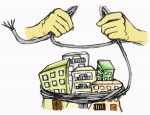There are two main problems facing the future of the Internet in America.
One is net neutrality, which is the ability of companies to choose what content they make accessible to consumers. The other major problem is broadband deployment throughout the United States. Broadband is essentially an Internet connection that’s fast enough to deliver “high quality voice, data, graphics and video.”
Despite its importance, Americans are generally unaware of the facts surrounding net neutrality and broadband deployment. Even more unfortunately, college students – usually a fairly involved and active population when it comes to activism – never seem to give it the attention that’s often paid to other social or political issues.
Net neutrality and broadband deployment issues have a significant impact on how students access the Internet, which makes up a huge part of the way they do almost everything, from homework and classes to extracurricular activities and social justice activism.
Both of these issues have one important solution, which students should work to inform both themselves and others about: classifying broadband Internet as a public necessity, and protecting it as such.
The impact of these issues can be felt everywhere, including Westwood, where there are only two Internet service providers (ISPs) available for residential use: Verizon and Time Warner Cable. Only the latter offers broadband speeds, so there is no competition in that category. This is exactly why the prices are so high while the service is so poor. For students at UCLA, then, these issues have a direct impact on our lives.
In addition to the immediate role the Internet plays in our lives, we have plenty of other reasons to support knowledge and information dissemination about net neutrality and broadband deployment. One clear reason is that the access to an open, reasonably fast and affordable web is essential to the development of activism and social justice movements, which college students are often invested in starting and joining.
The best modern example of the importance of Internet service is the protests that began in the Arab Spring in 2010. The spread of information through social media was a critical component in getting the support the protests needed to fight against tyrannical governments. Governments went to great lengths to censor the information being spread through the Internet, and even went as far as to shut it down completely.
While UCLA students and staff protest frequently about many different social concerns, they hardly ever stand up for the tool that makes all these battles for progress possible.
Approximately 17 percent of Americans don’t have access to broadband Internet, and another 50 percent only have one company that offers a qualifying service. These numbers are far too low, and they’re directly affecting the way people in this country use the Internet.
Fortunately, the Federal Communications Commission is expected to propose a new measure on Thursday that could help solve these two dilemmas by fostering competition and ensuring an open Internet. To do this, the FCC is expected to reclassify broadband as a common carrier service under Title II of the Communications Act of 1934.
Simply put, this means that broadband would be considered an essential public utility, similar to telephone service. If this is done, the FCC could ban paid prioritization outright.
Title II classification could also help foster new competition in the market. Right now, ISPs spend millions of dollars lobbying to create obstacles that threaten to keep potential competitors away. In the meantime, they continue to build their networks slowly and charge high prices, rather than putting their capital toward new technologies and beating out competitors in a fair and open marketplace. If these obstacles are removed, quality will improve and prices will fall from the increased supply.
Students at UCLA and across the country should keep their eyes on this proposal, which is expected to be released on Thursday and will be voted on at a meeting on Feb. 26.
While net neutrality and the current state of broadband deployment in the United States are both covered in the news frequently, there seems to be apathy among students concerning the current debate over the future of broadband. Considering the importance of this topic, especially to our generation, it’s disheartening to see it receive less attention than many other social issues.
All freedoms are relative to the circumstances in which they exist. In our world, having freedom unquestionably means having access to reliable, reasonably fast, and affordable broadband Internet. It’s time we start treating this as the important social issue it is.
